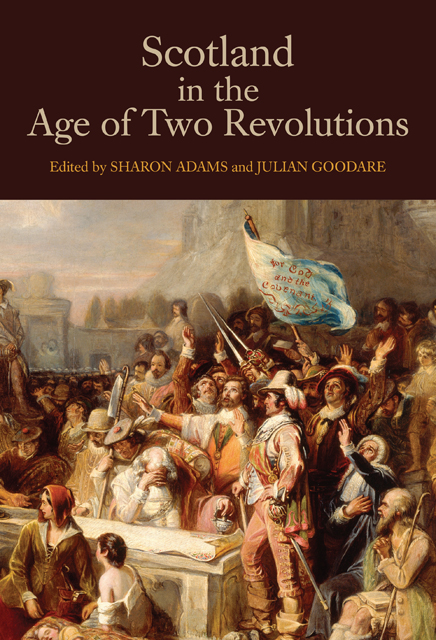Book contents
- Frontmatter
- Dedication
- Contents
- Figures and Tables
- List of Contributors
- Preface
- List of Abbreviations
- 1 Scotland and its Seventeenth-Century Revolutions
- 2 The Middle Shires Divided: Tensions at the Heart of Anglo-Scottish Union
- 3 The Western Highlands and Isles and Central Government, 1616–1645
- 4 The Scottish Bishops in Government, 1625–1638
- 5 The Scottish Revolution
- 6 In Search of the Scottish Republic
- 7 Highland Lawlessness and the Cromwellian Regime
- 8 The Worcester Veterans and the Restoration Regime in Scotland
- 9 The Political Thought of the Restoration Covenanters
- 10 Scottish State Oaths and the Revolution of 1688–1690
- 11 The Tribulations of Everyday Government in Williamite Scotland
- 12 The Company of Scotland and Scottish Politics, 1696–1701
- Chronology of Seventeenth-Century Scotland
- Further Reading
- Index
- Studies in Early Modern Cultural, Political and Social History
2 - The Middle Shires Divided: Tensions at the Heart of Anglo-Scottish Union
Published online by Cambridge University Press: 28 February 2023
- Frontmatter
- Dedication
- Contents
- Figures and Tables
- List of Contributors
- Preface
- List of Abbreviations
- 1 Scotland and its Seventeenth-Century Revolutions
- 2 The Middle Shires Divided: Tensions at the Heart of Anglo-Scottish Union
- 3 The Western Highlands and Isles and Central Government, 1616–1645
- 4 The Scottish Bishops in Government, 1625–1638
- 5 The Scottish Revolution
- 6 In Search of the Scottish Republic
- 7 Highland Lawlessness and the Cromwellian Regime
- 8 The Worcester Veterans and the Restoration Regime in Scotland
- 9 The Political Thought of the Restoration Covenanters
- 10 Scottish State Oaths and the Revolution of 1688–1690
- 11 The Tribulations of Everyday Government in Williamite Scotland
- 12 The Company of Scotland and Scottish Politics, 1696–1701
- Chronology of Seventeenth-Century Scotland
- Further Reading
- Index
- Studies in Early Modern Cultural, Political and Social History
Summary
On 7 April 1603, as James VI and I rode south to assume his English crown, he stopped at Berwick to proclaim that since ‘the pairt of baith the countreyes quhilk of late wes callit the Marchis and Bordouris’, is now ‘be the happie union … the verie hart of the countrey’; the former English and Scottish marches were to be rechristened the ‘Middle Shires’. In doing so, he was attempting to create a cross-border entity out of two regions that had a month previously been divided by a frontier between two independent sovereignties. To accomplish this, James was to write in 1604,
it is neccssaire that querrellis amoungst thaim be reconcyled and all straingenes betwene the nations quyte removed; that all theeves, murderers, oppressouris and vagabondis be quyte rooted out, … [and] that severe and indifferent justice be ministered upon all offenders.
From 1605, a pacification of crime on both sides of the border was prosecuted with an unprecedented persistence. In late 1606, when progress was deemed slow, James’s loyal enforcer, George Home, earl of Dunbar, was appointed lieutenant to maintain the severity of the operation. For James, the pacification of the Middle Shires formed a central part of his Union project – a project that dominated the earlier years of his English reign.
I
James dreamed of a ‘perfect Union’, but in 1603, union between England and Scotland was limited to that which existed in his kingship of both; a regal or dynastic union. He envisaged much more: a union of hearts and minds, cemented through the greater integration of the political and legal systems of the two ‘auld enemies’. The English and Scottish parliaments were called in the spring of 1604 to agree articles for negotiation by a union commission, and at James’s urgent behest, on 20 October 1604, commissioners from the two kingdoms met in London to draw up a plan for fuller union. In November 1606, these articles were presented to the English parliament and protracted and impassioned debates began. Against this background, the new Middle Shires were intended as an exemplar of Union to convince dubious English parliaments from 1604 to 1607 of its merits: the pacification of crime, cross-border co-operation, the harmonious ‘hart of the countrey’.
- Type
- Chapter
- Information
- Scotland in the Age of Two Revolutions , pp. 23 - 40Publisher: Boydell & BrewerPrint publication year: 2014
- 1
- Cited by



